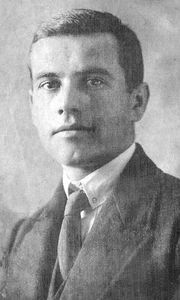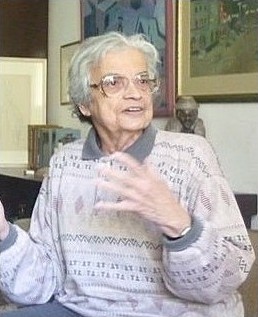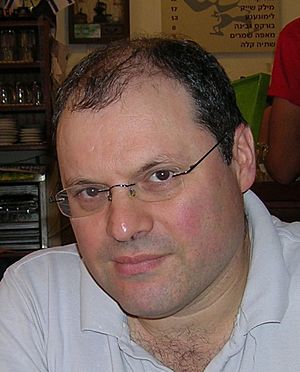Maya Ulanovskaya facts for kids
Quick facts for kids
Maya Ulanovskaya
|
|
|---|---|
| Майя Александровна Улановская | |
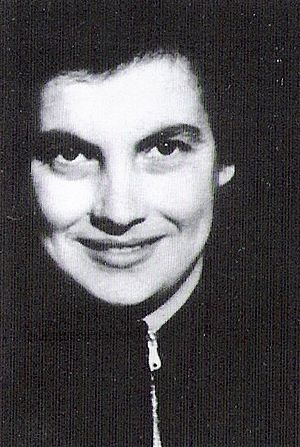
Maya Ulanovskaya (around 1955)
|
|
| Born |
Maya Aleksandrovna Ulanovskaya
October 20, 1932 |
| Died | June 25, 2020 |
| Citizenship | Soviet Union Israel |
| Occupation | Literary critic, translator, teacher |
| Movement | Human rights movement in the Soviet Union |
| Spouse(s) | Anatoly Yakobson |
| Children | Alexander Yakobson |
| Parent(s) | Alexander Ulanovsky, Nadezhda Ulanovskaya |
Maya Aleksandrovna Ulanovskaya (born October 20, 1932 – died June 25, 2020) was an American-born Russian-Israeli writer and translator. She was also a professor. Maya Ulanovskaya and her husband, Anatoly Yakobson, were part of the human rights movement in the Soviet Union. This movement worked to protect people's basic rights.
Contents
Early Life and Family
Maya Aleksandrovna Ulanovskaya was born in New York City. Her parents, Alexander Ulanovsky and Nadezhda Ulanovskaya, were Jewish and worked for the Soviet government at the time.
A writer named Whittaker Chambers knew Maya's parents in the 1930s. He wrote that Maya had an older brother. Sadly, her brother was killed fighting during the Nazi invasion of the Soviet Union.
Life in the Soviet Union
Challenges and Activism
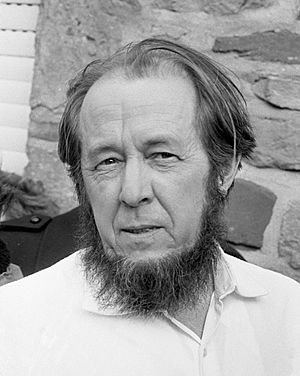
In 1948 and 1949, Maya Ulanovskaya's parents were arrested. They were accused of political crimes. Their story was even mentioned in a famous book called The Gulag Archipelago by Aleksandr Solzhenitsyn. This book talked about the harsh labor camps in the Soviet Union.
In 1949, Maya finished school. She then went to the Moscow Institute of Food Industry. There, she joined a secret student group. This group was against the Soviet leader, Joseph Stalin.
On February 7, 1951, Maya and 15 other people were arrested. A year later, on February 13, 1952, she was sentenced to 25 years in a special labor camp. These camps, called the Gulag, were for political prisoners. In 1956, her sentence was changed to five years, and she was released. Many others were also set free around that time.
In the 1960s and 1970s, Maya worked at a library in Moscow. She also continued her human rights work. She helped share banned writings, known as samizdat, and sent information to other countries. This helped people outside the Soviet Union learn about human rights issues.
Life in Israel
New Beginnings
In 1973, Maya Ulanovskaya moved to Israel with her husband and son. She later divorced her husband in 1974.
In Israel, Maya worked at the National Library in Jerusalem. She became a translator, changing books from English, Hebrew, and Yiddish into Russian. She translated works by famous writers like Arthur Koestler.
In 1989, the highest court in the Soviet Union officially cleared her name. They said there was no proof of her guilt. This was called "rehabilitation."
Family Life
In 1956, Maya Ulanovskaya married Anatoly Yakobson. Their son, Alexander Yakobson, was born in 1959. In 1973, Maya moved to Israel with her husband, son, and mother.
Published Works
Maya Ulanovskaya wrote a book with her mother. It tells the story of two generations of their family.
Her memoir shares details about:
- The early work of Whittaker Chambers.
- Life in the Soviet Union under Stalinism for young people after the war.
- The history of women.
- Russian women writers.
Writings:
- История одной семьи (translated History of One Family) (1982, 1994, 2003, 2005)
- The Family Story (2016)
- Jews in the culture of the Russian emigre (1995)
- Internal Plan of Life (on Vladimir Gershuni) (1996)
- Freedom and dogma: the life and work of Arthur Koestler (1996)
- "Why Koestler?" (1997)
- The Jewish National Library and its Russian Roots (1999)
- On Anatoly Yacobson (2010)
- The Serene Breathing of Sadness (2017) by Anatoly Yakobson (compiler)
Translations from Hebrew to Russian:
- The Book of Testimony (1989) by Abba Kovner
- Letters Yoni: portrait of a hero (1984) by Yonatan Netanyahu
- The Last Fight Yoni (2001) by Yonatan Netanyahu
Translations from English to Russian:
- Thieves in the Night (1981) by Arthur Koestler
- The Thirteenth Tribe (1998) by Arthur Koestler
- Arrival and Departure (2017) by Arthur Koestler
Translations from Yiddish to Russian:
- My memories (2009, 2012) by Yechezkel Kotik
See also
- Alexander Ulanovsky (father)
- Nadezhda Ulanovskaya (mother)
- Anatoly Yakobson (spouse)
- Alexander Yakobson (son)
- Human rights movement in the Soviet Union
- Initiative Group for the Defense of Human Rights in the USSR
External sources
- Freedom and Dogma by Arthur Koestler
- Why Koestler
- Улановская Майя Александровна (1932)
 | Delilah Pierce |
 | Gordon Parks |
 | Augusta Savage |
 | Charles Ethan Porter |


